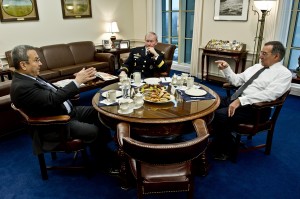Special to WorldTribune.com
WASHINGTON — Western diplomatic sources said the administration of President Barack
Obama has agreed to end open opposition to an Israeli attack on Iran’s
nuclear facilities.
They said the administration, which already reviewed
military options against Iran, has instead focused on military and
intelligence coordination with Israel as well as reducing dangers of a
global oil crisis.

“Israel has to make its own decisions,” Anthony Blinken, a White House security official, said. “We are not in the business of telling our allies and partners what to do when it comes to their own national security.”
The diplomats said the administration’s new policy continued to caution publicly against any attack on Iran. But in private meetings, they said, U.S. officials and diplomats were discussing war scenarios on the assumption that Israel was prepared to destroy Iran’s nuclear infrastructure by the end of the year, Middle East Newsline reported.
In an address to the Israel Policy Forum, Blinken was said to express the new administration policy. Blinken, the national security adviser to Vice President Joseph Biden, said Israel and the United States were in close coordination regarding Iran and did not rule out a surprise for the Teheran regime.
“It [administration policy] is about buying time and continuing to move this problem into the future,” Blinken said. “And if you can do that strange things can happen in the interim. You never know.”
“I got the sense that Israel is incredibly serious about a strike on their nuclear weapons program,” House Intelligence Committee chairman Rep.
Mike Rogers said in a U.S. television interview.
“It’s their calculus that
the administration is not serious about a real military consequence to Iran
moving forward. They believe they’re going to have to make a decision on
their own, given the current posture of the United States.”
Rogers returned from a visit to Israel in late February and met Israeli
Prime Minister Benjamin Netanyahu and Defense Minister Ehud Barak. Barak has
been discussing Iran with administration officials while Netanyahu planned
to meet Obama on March 5.
“We are committed, as Israel is, to preventing Iran from acquiring a
nuclear weapon,” White House spokesman Jay Carney said on Feb. 29. “We do,
however, believe that there is time and space to pursue diplomacy.”
A report by Israel’s leading strategic center, the Institute for
National Security Studies, asserted that Washington could have dropped its
opposition to an Israeli attack on Iran. In a report by Israeli analyst Zaki
Shalom, the institute cited statements by Obama and Defense Secretary Leon
Panetta, who assessed that Israel could strike Teheran as early as April.
“These statements reflect a different attitude, in terms of phrasing and
general tone, than the one characterizing American official pronouncements
in recent months,” the report, titled “The U.S. on an Israeli Military
Strike against Iran: A Change in Position?” said.
Shalom, regarded as close to the Israeli government, said Obama and
Panetta appeared to have ended efforts to persuade Israel to support
international sanctions on Iran. He said the Israeli leadership was
interpreting the new U.S. tone as a “certain loosening of the reins on
Israel should it decide to attack Iran, even if the statements were not
intended as such.”
On Feb. 18, Gen. Martin Dempsey, the chairman of the Joint Chiefs of
Staff, stressed that he was not urging Israel against an attack on Iran.
Dempsey, who recently held talks with the Israeli leadership, told the
Senate Budget Committee that he has sought to coordinate with Jerusalem.
“We’ve had a conversation with them about time, the issue of time,”
Dempsey said.
The diplomats said the new administration policy was not meant to
encourage an Israeli attack, particularly over the next few months. But they
said the administration preferred to play down differences with Israel amid
growing support in Congress for the destruction of Iran’s nuclear weapons
capabilities.
“People are giving Israel a lot of advice here lately from America,”
Sen. Lindsay Graham, who introduced a resolution against a U.S. containment
policy of a nuclear Iran, said. “I just want to tell our Israeli friends
that my advice to you is never lose control of your destiny. Never allow a
situation to develop that would destroy the Jewish state.”

You must be logged in to post a comment Login